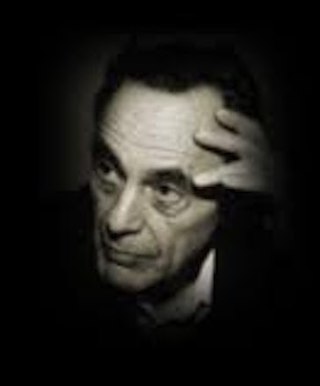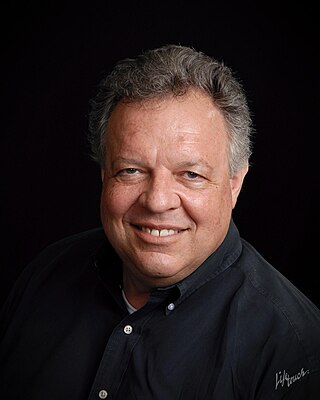Related Research Articles
Psychotherapy is the use of psychological methods, particularly when based on regular personal interaction, to help a person change behavior, increase happiness, and overcome problems. Psychotherapy aims to improve an individual's well-being and mental health, to resolve or mitigate troublesome behaviors, beliefs, compulsions, thoughts, or emotions, and to improve relationships and social skills. Numerous types of psychotherapy have been designed either for individual adults, families, or children and adolescents. Certain types of psychotherapy are considered evidence-based for treating some diagnosed mental disorders; other types have been criticized as pseudoscience.
Positive psychology studies the conditions that contribute to the optimal functioning of people, groups, and institutions. It studies "positive subjective experience, positive individual traits, and positive institutions... it aims to improve quality of life."
Humanistic psychology is a psychological perspective that arose in the mid-20th century in answer to two theories: Sigmund Freud's psychoanalytic theory and B. F. Skinner's behaviorism. Thus, Abraham Maslow established the need for a "third force" in psychology. The school of thought of humanistic psychology gained traction due to key figure Abraham Maslow in the 1950s during the time of the humanistic movement. It was made popular in the 1950s by the process of realizing and expressing one's own capabilities and creativity.
Clinical psychology is an integration of human science, behavioral science, theory, and clinical knowledge for the purpose of understanding, preventing, and relieving psychologically-based distress or dysfunction and to promote subjective well-being and personal development. Central to its practice are psychological assessment, clinical formulation, and psychotherapy, although clinical psychologists also engage in research, teaching, consultation, forensic testimony, and program development and administration. In many countries, clinical psychology is a regulated mental health profession.
Rational emotive behavior therapy (REBT), previously called rational therapy and rational emotive therapy, is an active-directive, philosophically and empirically based psychotherapy, the aim of which is to resolve emotional and behavioral problems and disturbances and to help people to lead happier and more fulfilling lives.
Theoretical psychology is concerned with theoretical and philosophical aspects of psychology. It is an interdisciplinary field with a wide scope of study.
Person-centered therapy, also known as person-centered psychotherapy, person-centered counseling, client-centered therapy and Rogerian psychotherapy, is a form of psychotherapy developed by psychologist Carl Rogers and colleagues beginning in the 1940s and extending into the 1980s. Person-centered therapy seeks to facilitate a client's actualizing tendency, "an inbuilt proclivity toward growth and fulfillment", via acceptance, therapist congruence (genuineness), and empathic understanding.
Existential psychotherapy is a form of psychotherapy based on the model of human nature and experience developed by the existential tradition of European philosophy. It focuses on concepts that are universally applicable to human existence including death, freedom, responsibility, and the meaning of life. Instead of regarding human experiences such as anxiety, alienation and depression as implying the presence of mental illness, existential psychotherapy sees these experiences as natural stages in a normal process of human development and maturation. In facilitating this process of development and maturation existential psychotherapy involves a philosophical exploration of an individual's experiences while stressing the individual's freedom and responsibility to facilitate a higher degree of meaning and well-being in his or her life.

Eugene Tovio Gendlin was an American philosopher who developed ways of thinking about and working with living process, the bodily felt sense and the "philosophy of the implicit". Though he had no degree in the field of psychology, his advanced study with Carl Rogers, his longtime practice of psychotherapy and his extensive writings in the field of psychology have made him perhaps better known in that field than in philosophy. He studied under Carl Rogers, the founder of client-centered therapy, at the University of Chicago and received his PhD in philosophy in 1958. Gendlin's theories impacted Rogers' own beliefs and played a role in Rogers' view of psychotherapy. From 1958 to 1963 Gendlin was Research Director at the Wisconsin Psychiatric Institute of the University of Wisconsin. He served as an associate professor in the departments of Philosophy and Comparative Human Development at the University of Chicago from 1964 until 1995.
Acceptance and commitment therapy is a form of psychotherapy, as well as a branch of clinical behavior analysis. It is an empirically based psychological intervention that uses acceptance and mindfulness strategies along with commitment and behavior-change strategies to increase psychological flexibility.
Coherence therapy is a system of psychotherapy based in the theory that symptoms of mood, thought and behavior are produced coherently according to the person's current mental models of reality, most of which are implicit and unconscious. It was founded by Bruce Ecker and Laurel Hulley in the 1990s. It has been considered among the most well respected postmodern/constructivist therapies.
The therapeutic relationship refers to the relationship between a healthcare professional and a client or patient. It is the means by which a therapist and a client hope to engage with each other and effect beneficial change in the client.
In psychology, constructivism refers to many schools of thought that, though extraordinarily different in their techniques, are all connected by a common critique of previous standard approaches, and by shared assumptions about the active constructive nature of human knowledge. In particular, the critique is aimed at the "associationist" postulate of empiricism, "by which the mind is conceived as a passive system that gathers its contents from its environment and, through the act of knowing, produces a copy of the order of reality".
Logic-based therapy (LBT) is a modality of philosophical counseling developed by philosopher Elliot D. Cohen beginning in the mid-1980s. It is a philosophical variant of rational emotive behavior therapy (REBT), which was developed by psychologist Albert Ellis. A randomized, controlled efficacy study of LBT suggests that it may be effective in reducing anxiety.

Robert Rocco Cottone is a psychologist, ethicist, counselor and poet and has been a professor in the Department of Counseling and Family Therapy at the University of Missouri–St. Louis since 1988, where he is a colleague of the social activist Mark Pope. He is also the founder of the Church of Belief Science. Academically, he is best known for his socially oriented theories of counseling and psychotherapy. In the mid-1980s he developed a “systemic theory of vocational rehabilitation”, which constitutes the first comprehensive social theory of vocational rehabilitation. He has been widely cited for his later work on advanced theories of psychotherapy, and he has been rated as having one of the highest publishing records among his peers. He published his first book, Theories and Paradigms of Counseling and Psychotherapy, in 1992, which defined Kuhnian paradigms of mental health treatment. He then developed a fully social model of decision making, the social constructivism model, taking decisions out of the head, so-to-speak, and placing them within the sphere of social discourse. His social theorizing advanced from that of social systems to social constructions.
Vittorio Filippo Guidano was an Italian neuropsychiatrist, creator of the cognitive procedural systemic model and contributor to constructivist post-rationalist cognitive therapy. His cognitive post-rationalist model was influenced by attachment theory, evolutionary epistemology, complex systems theory, and the prevalence of abstract mental processes proposed by Friedrich Hayek. Guidano conceived the personal system as a self-organized entity, in constant development.
Diana Foșha is a Romanian-American psychologist, known for developing accelerated experiential dynamic psychotherapy (AEDP), and for her work on the psychotherapy of adults suffering the effects of childhood attachment trauma and abuse.
Second-wave positive psychology is a therapeutic approach in psychology that attempts to bring out the best in individuals and society by incorporating the dark side of human existence through the dialectical principles of yin and yang. This represents a distinct shift from focusing on individual happiness and success to the dual vision of individual well-being and collective humanity. PP 2.0 is more about bringing out the "better angels of our nature" than achieving optimal happiness or personal success. The approach posits that empathy, compassion, reason, justice, and self-transcendence will improve humans, both individually and collectively. PP 2.0 centers around the universal human capacity for meaning-seeking and meaning-making in achieving optimal human functioning under both desirable and undesirable conditions. This emerging movement is a response to perceived problems of what some have called "positive psychology as usual".
Adelbert H. Jenkins is an African American clinical psychologist who is known for his humanistic approach to Black psychology at the start of the field in the early 1970s. Jenkins was also one of the 28 founding members of the National Association of Black Psychologists, along with other notable psychologists such as Robert V. Guthrie and Joseph White. He is currently an associate professor of psychology at New York University.
Rachel Thies Hare-Mustin was an American clinical psychologist, known for her strong passion for social justice, civil rights, pacifism, and gender equality. As a scholar, she was known for her research in feminist postmodern theory, gender issues, and professional ethics, and for clinical application of feminist theory to family therapy.
References
- 1 2 "Psychology: Barbara S. Held". Bowdoin. Retrieved 2024-04-11.
- ↑ "Joseph B. Gittler Award - American Psychological Foundation". 9 March 2023.
- 1 2 Held, Barbara S. (1995). Back to reality : a critique of postmodern theory in psychotherapy (1st ed.). New York: W.W. Norton. ISBN 0393701921. OCLC 32272307.
- ↑ Cohen, Mariam (1996). "Back to Reality: A Critique of Postmodern Theory in Psychotherapy by Barbara S. Held (Book Review)". Journal of the American Academy of Psychoanalysis. 24 (3): 563–574.
- ↑ Held, Barbara S. (2001). Stop smiling, start kvetching : a 5-step guide to creative complaining (1st St. Martin's Griffin ed.). New York: St. Martin's Griffin. ISBN 0312283512. OCLC 47142054.
- 1 2 Held, Barbara S. (2007). Psychology's interpretive turn : the search for truth and agency in theoretical and philosophical psychology (1st ed.). Washington, DC: American Psychological Association. ISBN 9781591479253. OCLC 77270966.
- ↑ Erwin, Edward (2009-09-30). "Review Essay: Which Way Psychology? A Discussion of Barbara". Philosophy of the Social Sciences. 40 (2): 291–310. doi:10.1177/0048393109345669. ISSN 0048-3931. S2CID 144016393.
- ↑ Bohart, Arthur C., Held, Barbara S., Mendelowitz, Edward, Schneider, Kirk J. (2013). Humanity's dark side : evil, destructive experience, and psychotherapy. Washington, DC: American Psychological Association. ISBN 9781433811814. OCLC 795687202.
{{cite book}}: CS1 maint: multiple names: authors list (link) - ↑ Quinn, Adam (2013). "Review of Humanity's dark side: Evil, destructive experience, and psychotherapy". The Humanistic Psychologist. 41 (3): 304–308. doi:10.1080/08873267.2013.771120. ISSN 1547-3333.
- ↑ Osbeck, Lisa M., Held, Barbara S. (2014-08-25). Rational intuition : philosophical roots, scientific investigations. New York, NY. ISBN 9781107022393. OCLC 867851585.
{{cite book}}: CS1 maint: location missing publisher (link) CS1 maint: multiple names: authors list (link) - ↑ Held, Barbara S. (2002). "The tyranny of the positive attitude in America: Observation and speculation". Journal of Clinical Psychology. 58 (9): 965–991. doi:10.1002/jclp.10093. ISSN 0021-9762. PMID 12209859.
- ↑ "Book Review: The Happiness Industry by William Davies". The Christian Humanist. 2017-07-05. Retrieved 2018-11-29.
- ↑ Held, Barbara S. (2004). "The Negative Side of Positive Psychology". Journal of Humanistic Psychology. 44 (1): 9–46. doi:10.1177/0022167803259645. ISSN 0022-1678. S2CID 146703182.
- ↑ Held, Barbara S. (1990). "What's in a name? Some confusions and concerns about constructivism". Journal of Marital and Family Therapy. 16 (2): 179–186. doi:10.1111/j.1752-0606.1990.tb00837.x. ISSN 0194-472X.